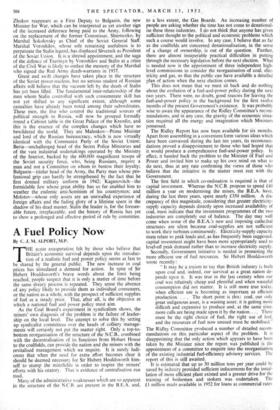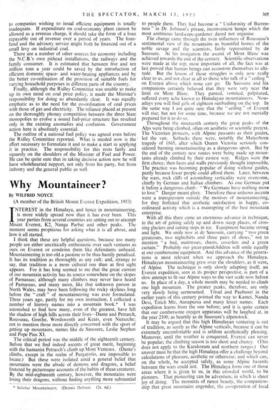A Fuel Policy Now
By C. J. M. ALPORT, M.P. THE acute exasperation felt by those who believe that Britain's economic survival depends upon the introduc- tion of a realistic fuel and power policy seems at last to be shared by the general public. The new increase in coal prices has stimulated a demand for action. In spite of Sir Hubert Houldsworth's brave words about the limit being reached, people suspect that it is only a matter of time before the same dreary process is repeated. They sense the absence of any policy likely to provide them as individual consumers, or the nation as a whole, with the prospect of sufficient supplies of fuel at a steady price. That, after all, is the objective at which a national fuel and power policy must aim.
As the Coal Board's experiment in syndicalism shows, the miners' own diagnosis of the problem is the failure of leader- ship on the local level. The attempt to solve this by setting up syndicalist committees over the heads of colliery manage- ments will certainly not put the matter right. Only a top-to- bottom reorganisation of the structure of the N.C.B., combined with the decentralisation of its functions from Hobart House to the coalfields, can provide the nation and the miners with the revitalised management which we require. It is surely ludi- crous that when the need for extra effort becomes clear it should be deemed necessary for Sir Hubert Houldsworth him- self to stump the minefields in order to inspire the miners' efforts with his oratory. That is evidence of centralisation run mad. Many of the administrative weaknesses which are so apparent in the structure of the N.C.B. are present in the B.E.A. and, to a less extent, the Gas Boards. An increasing number of people are asking whether the time has not come to denational- ise these three industries. I do not think that anyone has given sufficient thought to the political and economic problems which such a course would involve. In any case, I believe that as far as the coalfields are concerned denationalisation, in the sense of a change of ownership, is out of the question. Further, there are almost insuperable practical difficulties in putting through the necessary legislation before the next election. What is needed now is the appointment of three independent high- level commissions to consider the reorganisation -of coal, elec- tricity and gas, so that the public can have available a detailed plan of action when the next election comes. This does not mean that we must sit back and do nothing about the evolution Of a fuel-and-power policy during the next two years. There were, no doubt, good reasons for leaving the fuel-and-power policy, in the background for the first twelve months of the present Government's existence. It was probably wise to await the appearance of the Ridley Committee's recom- mendations, and in any case, the gravity of the economic situa- tion required all the energy and imagination which Ministers possessed.
The Ridley Report has now been available for six months. Apart from assembling in a convenient form various ideas which have been canvassed during the last ten years, its recommen- dations proved a disappointment to those who had hoped that it would produce a comprehensive fuel-and-power policy. In effect, it handed back the problem to the Minister of Fuel and Power and invited him to make up his own mind on what to do next, thus at any rate confirming the views of those who believe that the initiative in the matter must rest with the Government.
The first field in which co-ordination is required is that of capital investment. Whereas the N.C.B. propose to spend £40 million a year on modernising the mines, the B.E.A. have, during the last three years, spent nearly £350 million. A dis- crepancy of this magnitude, considering that greater electricity- supply capacity depends directly upon increased availability of coal, must indicate that the investment programmes of the two industries are completely out of balance. The day may well come when some of the B.E.A.'s new and imposing cathedral structures are silent because _coal-supplies are not sufficient to work their turbines continuously. Electricity-supply capacity must relate to peak loads and, as has frequently been suggested, capital investment might have been more appropriately used to level-off peak demand rather than to increase electricity supply.
Secondly. Government initiative is needed in promoting the more efficient use of fuel resources. Sir Hubert Houldsworth wrote recently : "It may be a truism to saythat British industry is built upon coal and, indeed, our survival as a great nation de- pends upon it. It was true in the last century when our coal was relatively cheap and plentiful and when wasteful consumption did not matter. It is still more true today, when efficient use is becoming as important as efficient production. . . . The short point is this: coal, our only great indigenous asset, is a wasting asset; it is getting more difficult and expensive to produce and, at the same time. more calls are being made upon it by the nation.... There must be the right- choice of fuel, the right use of fuel. and the resources of fuel now unused must be mobilised."
The Ridley Committee produced a number of detailed recom- mendations on this, particular aspect of the problem. It is disappointing that the only action which appears to have been taken by the Minister since the report was published is the appointment of a committee to enquire into the reorganisation of the existing industrial fuel-efficiency advisory services. The report of this is still awaited. It is estimated that up to 30 million tons per year could be saved by industry provided sufficient inducements for the instal- lation of more efficient plant existed and a greater drive for the training of boilermen and stokers was undertaken. The £1 million made available in 1952 for 'dans at commercial rates to companies wishing to instal efficient equipment is totally inadequate. If expenditure on coal-economy plant cannot be allowed as a revenue charge, it should take the form of a loan repayable out of revenue over a period of years. The loan- fund and the advisory service might both be financed out of a small levy on industrial coal. There are a number of other sources for economy including the N.C.B.'s own pithead installations, the railways and the family consumer. It is estimated that between five and ten million tons a year could be saved by the introduction of efficient domestic space- and water-heating appliances and by the better co-ordination of the provision of suitable fuels for varying household purposes in different parts of the country.
Finally, although the Ridley Committee was unable to make up its own mind on coal price policy, it made the Minister's responsibility for doing so abundantly clear. It was equally emphatic as to the need for the co-ordination of coal prices with those of gas and electricity. The reliance placed at present on the thoroughly phoney competition between the three State monopolies to evolve a sound fuel-price structure has resulted only in the existing anomalies and confusion. Government action here is absolutely essential.
The outline of a national fuel policy was agreed even before the Ridley Committee reported. What is needed now is the ' effort necessary to formulate it and to make a start in applying it in practice. The responsibility for this rests fairly and squarely on the shoulders of the Minister of Fuel and Power. He can be quite sure that in taking decisive action now he will have wholehearted support, not only from his party, but from industry and the .general public as well.



































 Previous page
Previous page